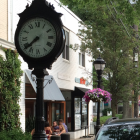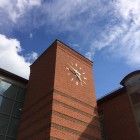News
Clocks Fall Back an Hour as Daylight Savings Time Ends This Sunday, Nov 3
|
We’ve all got an extra hour (according to the clock, anyway) this Sunday, which may mean darker mornings and will mean a bit more danger on the road, so be careful, AAA Northeast warns. Here’s a news release from the organization reflecting research showing a spike in traffic accidents (important to know for drivers and pedestrians) in the two weeks after the time change; and if accidents are up at that particular time, you know they’re likely to be up at other times:
When daylight fades and darkness looms, motor vehicle and pedestrian crashes on Connecticut roadways spike after Daylight Saving Time (DST) takes effect. So, drivers and pedestrians alike: beware of the 5 to 6 p.m. weekday ‘witching’ hour, warns AAA Northeast. DST ends Sunday, Nov. 3 this year and begins again on March 8, 2020. To call attention to National Drowsy Driving Prevention Week (November 3 – 10), AAA Northeast analyzed 2018 crash data from the UCONN Crash Data Repository, comparing the number of motor vehicle and pedestrian-related crashes in the two weeks before and after Daylight Saving Time ended and found:
—Statewide, the number of motor vehicle crashes between 5 to 6 p.m. increased by 159% in the two weeks after “fall back” compared with the two weeks before.



